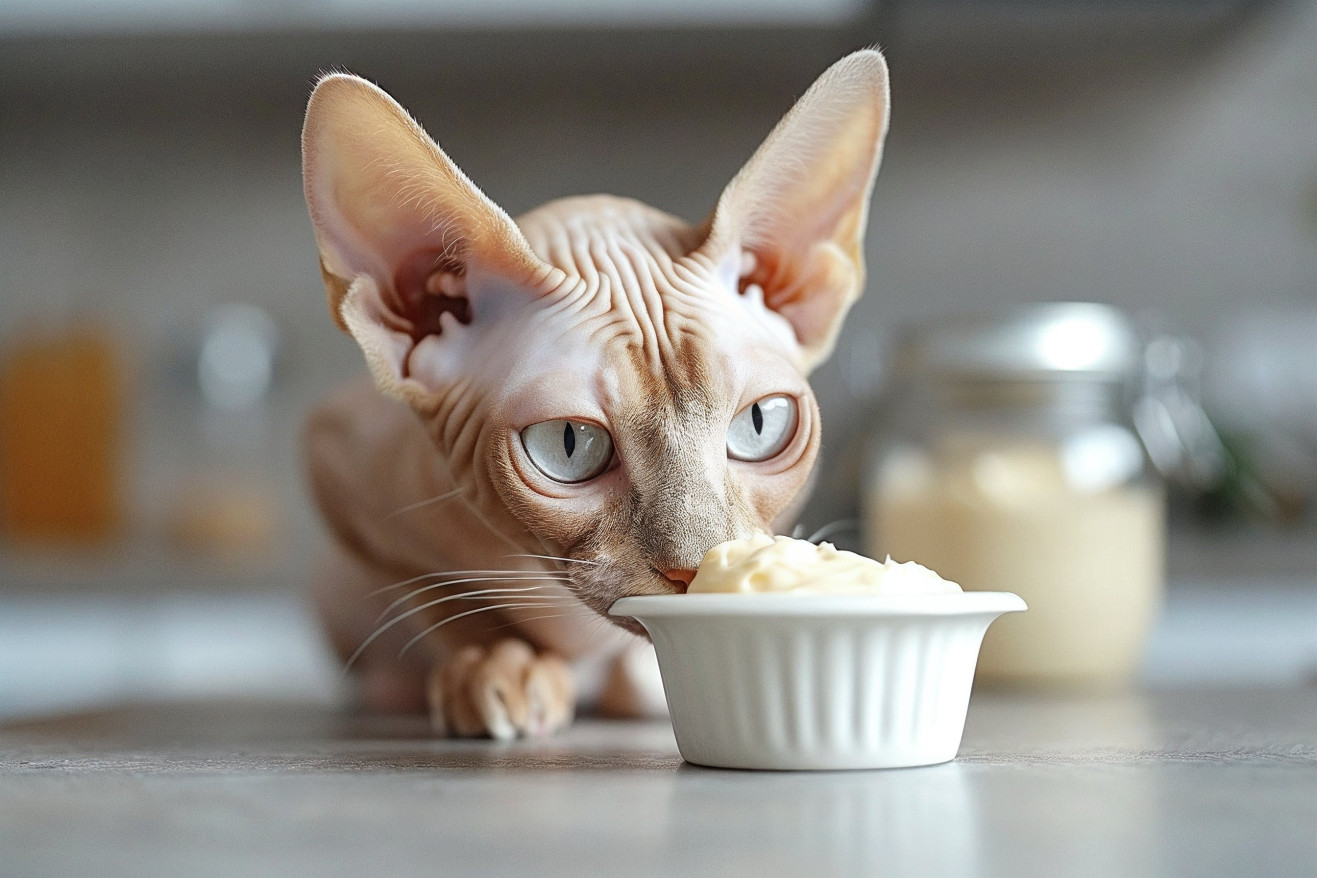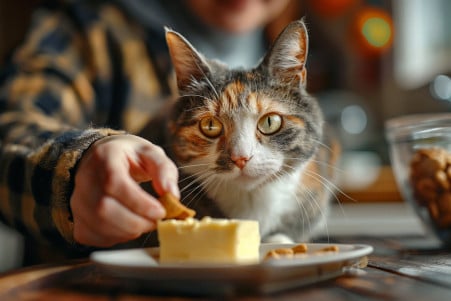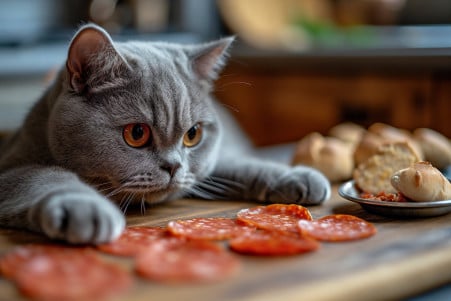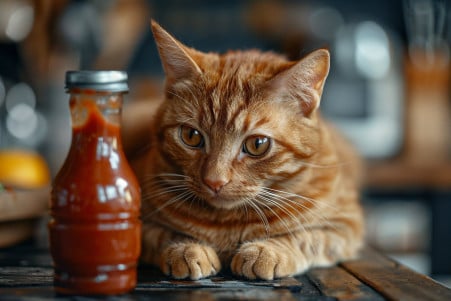Can Cats Eat Mayo? Understanding the Risks and Nutrition
2 February 2024

Even though your cat may be asking for a lick, is it safe to give them a little bit of mayonnaise? While cats can technically have a small amount of mayonnaise without any immediate negative effects, it’s not a good idea. The high fat content of mayonnaise can lead to obesity and digestive problems in cats and doesn’t offer any nutritional value.
This article takes a deep dive into feline nutrition and dietary needs and compares them to the ingredients and nutritional content of mayonnaise. Using information from veterinary journals, animal nutrition studies, and input from experts, it also looks at how human food impacts cats’ health. By the end, you’ll have a better idea of what makes up a healthy diet for cats and where mayonnaise falls—or doesn’t fall—in meeting their nutritional requirements.
Can cats eat mayo?
What Cats Need From Their Diet
Cats are obligate carnivores, which means they need certain nutrients that are only found in animal tissue to survive. A study from VCA Animal Hospitals explains that cats have evolved to need a specific combination of nutrients that are only found in meat, including essential fatty acids, vitamins, and certain amino acids like taurine and arginine.
These nutrients are not found in plant tissue in a form that cats can use, which is why cats need to get their protein from animal sources.
In fact, the Purina Institute says that taurine, arginine, and other nutrients like vitamin A and niacin are only found in animal tissue. These nutrients are important for cats’ vision, heart health, and overall health.
On the other hand, a diet high in fat and carbohydrates can be harmful to cats and lead to problems like obesity and diabetes mellitus. This is especially true of human food, which is often made with ingredients and has nutrient levels that are not appropriate for cats.
According to PetMD, cats should get a very small amount of their daily calories from carbohydrates, ideally less than 10%. This is a clear example of the difference between human and feline nutrition and helps explain why human foods, especially high-fat options like mayonnaise, are not a good choice for cats.
Breaking Down the Ingredients of Mayonnaise and How They Affect Cats
Mayonnaise is made up of eggs, oil, and an acid like vinegar or lemon juice. While this combination may not sound harmful, it’s not a good fit for a cat’s dietary needs.
According to Pets Curiosity, mayonnaise is high in fat, which is not in line with a cat’s carnivorous diet. This is especially concerning given that VCA Hospitals states that nearly 60% of pet cats in the United States are overweight, and the high fat content in mayonnaise could contribute to obesity, a major health issue.
In addition to the fat, mayonnaise is often made with other ingredients like additives and preservatives that could be harmful to cats.
For example, ResearchGate references a study in the Journal of Small Animal Practice that raises concerns about the safety of several additives used in pet food. While these additives are worrisome in pet food, they are likely even more of a concern in human food products like mayonnaise, which is not made with cats’ nutritional needs in mind.
When you look at the nutritional content of mayonnaise versus what cats need, which is high protein, low fat, and certain nutrients like taurine, it’s clear that mayonnaise doesn’t measure up. Cats rely on the nutrition they get from their food to help them stay healthy and strong, but mayonnaise doesn’t contain any of the essential nutrients they need.
This significant nutritional deficiency highlights how unsuitable mayonnaise is for cats and sets the stage for a discussion of the potential health problems it could cause.
Mayonnaise and Your Cat’s Health
Although it mayonnaise is often thought of as a fun and harmless treat, it can actually cause a number of health problems for cats. For one, as Pets Curiosity points out, cats that eat mayonnaise are at risk of becoming overweight because of the condiment’s high-fat content, which can cause them to gain too much weight. This can then lead to a variety of other health issues, including diabetes, heart disease, and joint problems.
In addition, eating high-fat foods like mayonnaise can increase a cat’s risk of developing pancreatitis, a condition that causes the pancreas to become inflamed. As Today’s Veterinary Practice explains, the fat in mayonnaise can contribute to the development of this painful and potentially life-threatening condition in cats.
Moreover, the oil and egg yolks in mayonnaise can cause gastrointestinal problems in cats, such as vomiting and diarrhea. As Pets Curiosity explains, while these common ingredients aren’t toxic, they aren’t easily digested by cats and can cause digestive upset.
In the long term, feeding cats mayonnaise can have even more serious consequences. We Love Cats and Kittens points out that if cats eat mayonnaise on a regular basis, it can lead to unhealthy fat deposits and a variety of other health issues.
This makes it especially important to make sure that cats are eating a diet that’s specifically formulated to meet their nutritional needs so that they can stay healthy in the long run.
From the Menu: Can Cats Eat Anything in Mayonnaise?
Veterinarians have always recommended against feeding cats human food on a regular basis, and that includes mayonnaise. PetMD notes that feeding cats food that isn’t formulated for their nutritional needs can lead to digestive upset and even toxicity. This is because cats need a diet that is high in protein and low in carbohydrates, which is the opposite of many human foods.
That said, treats can be fun for your pet, but they should be chosen carefully. Paws and Effect recommends feeding cats plain meats that don’t have salt or spices added to them because this is the only way to ensure that they get the same nutrients that are in raw or properly supplemented cat food.
However, it’s important to remember that any human food should be fed in moderation and not in place of a species-appropriate diet.
For those who are looking for a cat-friendly alternative to mayonnaise, consider small amounts of cooked lean meats, steamed vegetables, or scrambled eggs, all in moderation. Make sure to introduce new foods slowly to avoid digestive upset and watch for any signs of a reaction.
If you’re ever unsure about whether a food is safe for your cat, it’s best to ask your vet. This will help ensure that you’re not only keeping your cat happy but also supporting their overall health.
Final Thoughts on Cats and Mayonnaise
As we’ve discussed, mayonnaise is not a good choice for cats. It doesn’t contain the nutrients that cats need and it has a high fat and calorie content that can cause obesity, pancreatitis, and other health problems, according to Pets Curiosity.
The salt in mayonnaise can also cause electrolyte imbalances and kidney issues. In addition, some of the ingredients in mayonnaise can cause allergies or be toxic to cats, including lemon juice and the additives in some brands, according to We Love Cats and Kittens.
It’s important to remember that cats have specific nutritional needs that are different from humans, especially when it comes to sharing human food with them. Cats need a diet that’s high in animal protein and they need certain amino acids, like taurine, that aren’t found in mayonnaise. Cats’ nutritional needs can’t be met by human food, especially food that’s high in fat and additives.
It’s important to talk to your vet about your cat’s specific dietary needs, especially before you feed them any human food. As CatTime points out, vets can help you figure out what treats are best for your cat and how much of them you should feed them.
It’s important to make sure that you’re keeping your cat healthy by feeding them a diet that meets their nutritional needs. Feeding them human food like mayonnaise can throw off their diet and cause long-term health problems.


